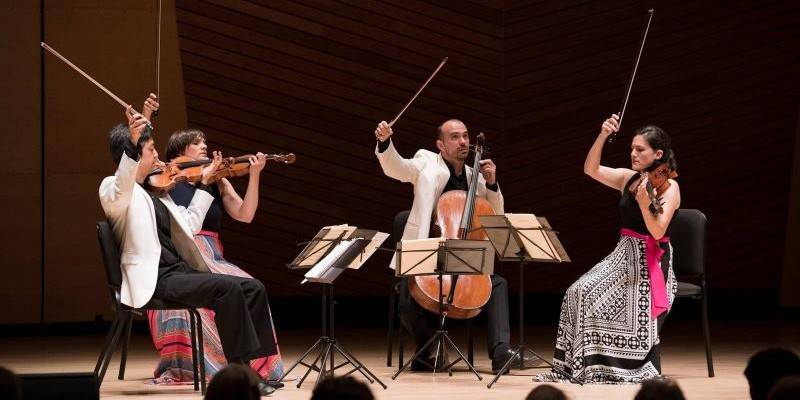On June 12th, Jupiter String Quartet will release their album Metamorphosis, featuring Beethoven’s Quartet Op. 131 and Ligeti’s Quartet No. 1 “Métamorphoses nocturnes.” The album was recorded at Krannert Center for the Performing Arts in March 2019.
Liz Freivogel, violist, elaborates on choosing these particular pieces:
“When quartet musicians picture their ideal chamber music experience, many of them think immediately of Beethoven’s Quartet Op. 131 in C-sharp Minor. There are few other works that require such a prolonged and intense communion with one another,” says Liz Freivogel. “Our quartet naively attempted to learn Op. 131 during our first year together. We spent countless hours trying to puzzle out its difficulties, hoping to navigate our way through its many tricks and traps. We did manage to perform it at the end of that year, but by no means did we grasp the full impact of the piece. Over our ensuing two decades together, we have returned many times to the vivid world of this work, each time bringing new life experiences to bear, and hopefully understanding a few more of the elements that make it so powerful. This recording represents our interpretation as it stands now in middle age (both in quartet years and lived years). No doubt our perspective will morph again by the time we next approach the work.”
As to why they chose the Ligeti for the companion piece, Freivogel explains, “A masterpiece in its own right, it contains a similarly powerful trajectory to that of Op. 131, but condensed into a shorter span. The technical challenges are even more extreme, as the quartet must transform from the most grindingly harsh climaxes to the most transparently soft textures, with little time to prepare in between. Whereas Op. 131 requires extreme patience and a focus on the long view, Ligeti makes more immediate demands, engaging fast-twitch muscles and split-second timing. His descriptions of character are vivid, even asking the players to imitate machines in some of the most terrifying scenes. Nevertheless, both works share a focus on a single, essential motivic kernel that returns in many guises throughout, capturing a sense of the entire life experience. This central idea—which is almost identical in its construction around a four note motive of paired semitones introduced in the opening first violin melody of each—is always present in some form, but must weather the extremes of emotion and fate before reaching a conclusion. In Beethoven’s case, this conclusion is an abrupt, enigmatic pivot to C sharp major, whereas Ligeti brings the journey to a more melancholy and lonely close.”
You can hear them perform the Beethoven piece here:








